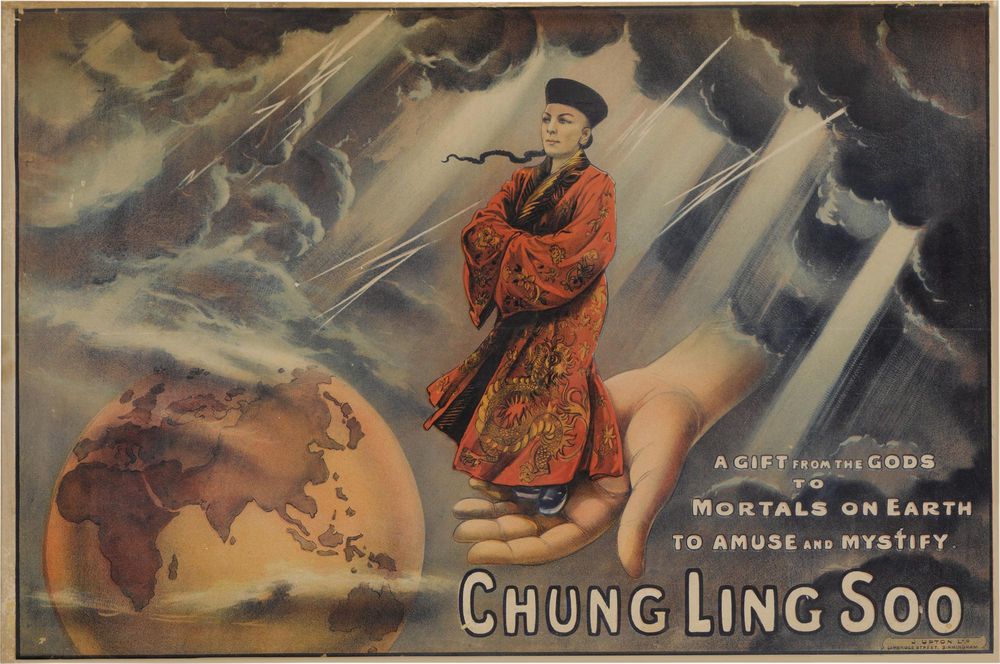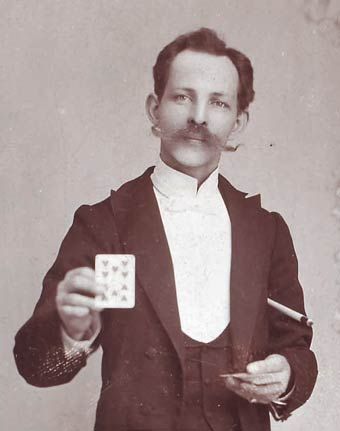One of the most dangerous and daring illusions that a magician can attempt is the famed bullet catch trick. There are several variation to the trick, but it usually goes like this—the magician produces an old-fashioned muzzle-loading gun and proceeds to load it with gunpowder. He drops a bullet into the barrel and uses a ramrod to push the bullet up against the gunpowder. He then hands the gun to an assistant (or a member of the audience) and invites him to shoot at the magician. The assistant complies. But instead of dropping down dead, the magician apparently catches the bullet with his hand, or dramatically produce it from between his teeth.

As with anything involving guns, the illusion is extremely dangerous because it has the potential to go terribly wrong. Many magicians have lost their lives attempting to catch the bullet. One of the best documented instance of a performer being killed while performing the gun trick is Chung Ling Soo, who was shot dead when the firearm malfunctioned in London in 1918.
Despite his name, Chung Ling Soo was not Chinese, but an American born to Scottish parents. His real name was William Ellsworth Robinson. William's father worked in traveling minstrel shows, performing hypnotism, impersonations, ventriloquism and magic tricks, all of which he taught his son.
Robinson performed his first magic show at the age of 14 and began performing professionally on the vaudeville circuit shortly thereafter. He initially performed under the name “Robinson, the Man of Mystery”, but later took on another stage name, “Achmed Ben Ali”, which closely resembled the stage name of German magician Max Auzinger, which was “Ben Ali Bey.” In fact, Robinson had copied not only the name but also his tricks, but as Auzinger never toured the United States, the resemblance went largely unnoticed at the time.

William Ellsworth Robinson before he took on his Chinese disguise. Photo: Didier Morax. C. Fechner Collection
In 1898, a Chinese magician named Ching Ling Foo began touring the United States. He stunned the audience by pulling 15-foot-long poles from his mouth, and beheading his servant boys who then walked off the stage headless. One of his best-known tricks was to produce a huge bowl of water from out of an empty cloth, and then pull a small child from the bowl. To drum up publicity for his shows, Foo offered a prize of $1,000 to anyone who could successfully duplicate his water bowl illusion. Robinson claimed that he had figured out how the illusion worked. Fearing that Robinson would reveal the trick, Foo withdrew the challenge and refused to meet him, which upset Robinson.
Two years later, when Robinson heard that an agent was looking for a Chinese magician to perform at Paris, he created a new identity for himself. He put on Chinese attire, shaved his facial hair and wore his hair in a queue. He began to call himself Chung Ling Soo (a variation of Ching Ling Foo's name). Robinson claimed that he was the son of a Scottish missionary who married a Cantonese woman. His story went that he was orphaned at 13 and raised by a Chinese magician, who taught him the secrets of Chinese magic tricks. Robinson never spoke onstage, claiming he spoke no English and always used an interpreter when he spoke to journalists. An American woman acted as his assistant, who also disguised herself as Soo’s Chinese wife, "Suee Seen".

Ching Ling Foo.
Robinson's new persona became a hit and he quickly became a popular stage magician in Europe and eventually became one of the highest-paid performers on the vaudeville circuit.
In January 1905, Chung Ling Soo and Ching Ling Foo were performing in London at the same time—Soo at the Hippodrome and Foo at the Empire Theater. Foo was aware that Chung Ling Soo was actually William Robinson and that he had copied virtually Foo’s entire act. Sick of the imposter, Foo announced that he would duplicate at least half of Chung Ling Soo's illusions to prove that he was the real “Original Chinese Conjurer”. But the press was not interested in Soo’s real identity. His act was as good as the original, and for the tabloids, it was all that mattered. Enduring public humiliation, Foo withdrew the challenge.
Soo’s most famous act, which he also stole from Foo and copied to near perfection, was “Condemned to Death by the Boxers.” In this trick, Soo’s assistants appeared on stage dressed as members of the Chinese secret society known as the Yihequan (“Righteous and Harmonious Fists”) or, as the English called them, “Boxers”. Several members of the audience were called upon the stage to mark a bullet that was loaded into a muzzle-loaded gun. The gun was then fired at Soo, who appeared to catch the bullet from the air and drop it into a plate. An audience member would inspect the bullet and declare that it was the same bullet that was marked and dropped into the barrel. In reality, the marked bullet never went into the gun but was slipped into Soo’s palm. What went into the muzzle was a substitute. The gun was also specially built to have two chambers, one that was loaded and the empty chamber below, which was ignited.


Chung Ling Soo next to his fake wife Suee Seen and an assistant child.
On March 23, 1918, while performing at the Wood Green Empire in London, Soo’s modified gun misfired and the bullet struck his lung. He fell to the ground and exclaimed, “Oh my God. Something’s happened. Lower the curtain,” speaking in English for the first time in public since he adopted his Chinese persona. He died the following day.
After Soo’s death, his true identity was revealed and the public was shocked to learn that he was not Chinese, although many professional magicians already knew that. A year before Soo's death, magician Will Goldston commented in an interview that the public did not question Soo's identity because “he has always presented to the public that which they like and not which he might prefer.”
Christopher Priest’s book The Prestige, and later its movie adaptation by Christopher Nolan, might have been inspired by the rivalry between Chung Ling Soo and Ching Ling Foo. In fact, Chung Ling Soo is a character in the film played by Chinese-born actor Chao Li Chi, and is seen producing a large bowl of water from a cloth—a trick made famous by Ching Ling Foo. Unfortunately for Nolan, he too fell for Soo’s ruse attributing the classic illusion to the imposter rather than to the original creator.












Comments
Post a Comment